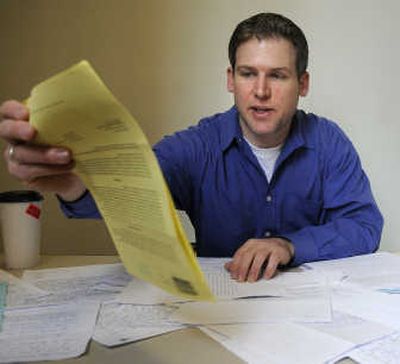Survey elicits poignant stories of rebound from childhood abuse

The 73-year-old woman said her father had broken her collarbone with his fist when she was a teenager. He’d killed her dog and burned her legs with a hot poker from the fireplace.
“When I had my three children I loved them so much I never hurt them,” the woman wrote at the end of a survey that graduate student Alex Liberman conducted for his master’s degree in social work at Eastern Washington University.
The survey was intended to gauge Spokane residents’ feelings about child abuse and neglect. It asked people to rank problems facing children and families, and to comment on the effectiveness of various solutions. But Liberman, 35, never expected the heartfelt personal experiences that poured out, unsolicited, handwritten by respondents who’d suffered child abuse.
“I was an abused child,” one woman wrote. “My mother beat us with an appliance cord and verbally abused us with every name and degradation imaginable. I was a 20-year-old first-time mother and NEVER abused my children. I knew it was wrong and I decided that I had the power to stop the cycle. It can be done.”
Some respondents wrote their comments next to a question that asked: “Do you think that children who are abused or neglected are more likely to abuse or neglect their children when they become parents?” Though 93 percent said “yes,” several people who said they were abused stressed they had never harmed their children.
“I think people felt compelled to say ‘I’m not one of those’ and just to be able to step up and announce that and write that to someone you don’t know is pretty powerful and very touching,” Liberman said.
People who have experienced childhood trauma frequently find talking about it to be therapeutic, said Mary Ann Murphy, executive director of Partners with Families and Children: Spokane, and a member of the Spokane Prevention of Child Abuse and Neglect Council.
“The fact that people find it helpful to be asked and have a place to express what happened to them as children, we’re learning that can be helpful to people,” Murphy said. “All the energy that gets wrapped up in keeping the secret is often the most harmful thing for the person’s development.”
As though to echo Murphy’s thoughts, one female survey respondent wrote: “I was one of these kids and in my day there was no info and so you didn’t speak of it. I wish I would have been able to tell someone. I have a great life and great kids, but I sometimes wonder if I would have had great parents what my life might have been. I’m just one of the lucky ones.”
Liberman and his research partners, Holly Crawford and Laura Henry, sent out 2,000 surveys to registered Spokane voters and got back about 560. As the surveys flowed in, Liberman said he was thrilled just to get so many back. But opening them and finding the emotional responses, he said, has motivated him to put the results to good use. Liberman and his adviser, Dr. Lisa Avery, are thinking of publishing the results, making them available to the public or presenting them to the Spokane City Council.
The students have been asked to collaborate with Murphy to submit the survey results for publication in a scholarly journal, Avery said. “We’d like Spokane’s story to be represented in the national scholarly press so it becomes part of the permanent research record,” she said, adding that she’d like to see the results used to help develop a course of action for addressing child abuse and neglect in this region.
The Martin Luther King Jr. Family Outreach Center used some of the results to apply for a $100,000 state grant that would provide home visitation for families where neglect is a problem. About 72 percent of survey respondents said they think parenting education is effective for addressing abuse and neglect.
“I’m pretty excited to know people value that,” said Suzanne Kolbe, who, as family service program director for the center, is preparing the grant application. The money would be used for training and intervention with families the state has identified as not having adequate parenting skills, Kolbe said. The intervention program would eventually serve up to 60 families annually, she added. “It would really be targeting the highest need families around these issues.”